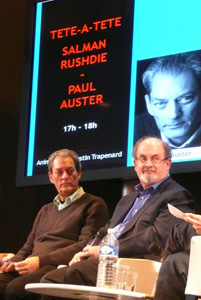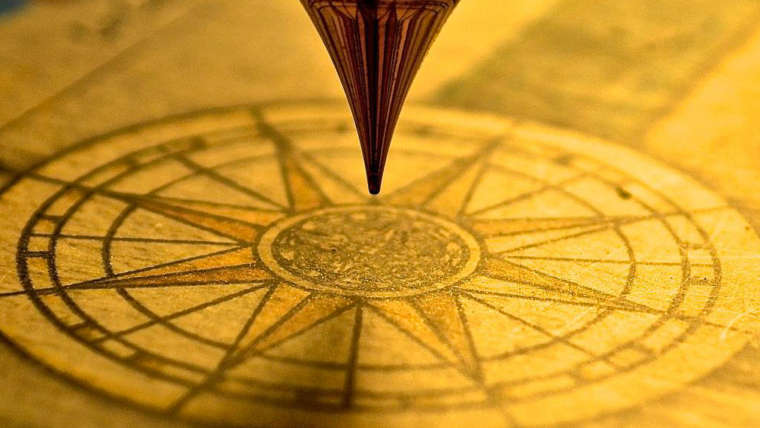
Voir Paul Auster et Salman Rushdie et grandir !
What is a delightful moment ? Maybe an intimate discussion between two of our most famous and talented contemporary writers. Not so intimate, to be honest, if we take into consideration the huge crowd of fans, admirers, curious, all suspended to each words uttered by the two protagonists on stage. Words. Precious apparatus that the two handle with such ability.
Paul Auster and Salman Rushdie are very good friends and share a common passion : New York.
They met there and both live there. The first one in Brooklyn (not very surprising for the scenarist of Smoke and Brooklyn Boogie) and the last one in Manhattan.
Of course, their meeting is worthy of a plot. A fatwa fall upon Salman Rushdie after the publication of his fifth novel, Satanic Verses. Likewise many people who felt concerned and shocked by this, not only because he’s also a writer, but as a human being who put freedom of speech as a fundamental human right, Paul Auster felt personnaly insulted, he felt insulted for all the writers because one can easily guess that censorship is the ultimate death for a writer. He had to participate in this “act of collective principle” as he said, reason why he naturally joined the worldwide support towards his fellowship, and the story could end like this.
Too simple for a plot ?
When Salman Rushdie’s children book Haroun and the Sea of Stories came out in 1990 – their mutual editor, namely Viking, asked Auster’s son if he’d like to be the first critic of the book and of course he did it with enthusiasm– he sent a letter to Salman Rushdie, with its critic, his father then told him to add at the end of the letter “my dad support you and please accept his entire solidarity and friendship”.
In a way, they met thanks to their children who consider themselves as a family.
Do they talk about writing when they are together ? Not at all !
Just friends’ topics such as money, sport (aah, the eternal opposition between the NY Mets and the NY Yankees supporters), love, food and last but not least, book critics… Of course !
New York… a city that includes so many fantasies with a widespread belief that you’re are a New Yorker once you had settled in the city and make your own story. It is not a legend. Let’s take Paris or London, we do not feel a Parisian nor a Londoner unless we lived there for years. Is it because NY, and the United States in general is a land of immigrants, the intermingling foreign cultures that gave birth to the American culture ?
There is something singular with the notion of “arrival”, and from your arrival, the important is not how long you stay in NY but how you make your own NY story according to Salman Rushdie. It is interesting (maybe for a girl of the city, like me) to hear the point of view of two “men of the city”, well, to be more precise, not the point of view, but what the city inspires to them, Salman Rushdie is fond of the noise and the smell, and Paul Auster is fascinated by the stone, the concrete. Organic versus Roughness.
Indeed, this is NY : a noisy odorant stony city !
And above all, a universal city in the sense that you don’t feel as a complete foreigner in the streets of NY.
It is striking to see that despite their huge rank, humility and simplicity stand out from these two figures.
I’m sorry but there are many pedant, pretentious, sufficient writers, it is so good to realize that men like Paul Auster and Salman Rushdie are so naturally simple and reflect such a great sense of humour. They master the thing, you know !
They do not have to exaggerate, to show off, they are themselves, not a second, I thought these guys are self-centered and this is the secret : they put “stories” first, even when they talk, not an inch of megalomania. When talking about “culture”, a speaker can easily fell into the “I know everything – I show that I am educated”, in French “étalage”, no way ! True, their experience as university professors help them, they know how to capture attention, they know when they have to emphasize, when they have to change the subject, and the result is an audience totally acquired.
Culture ? For Salman Rushdie who was raised in Bombay, he does not want to talk about “interpenetrating cultures” but of only one culture, a global culture that belongs to us all where each individual pick up what he wants. He used to listen to Elvis “The King” Presley when he was young, rock’n’roll to him did not sound foreign in India, it is only a kind of music. A genre.
This is a lesson of tolerance, and, may all the integrists, racists, ethnocentrists, narrow-minded people – to name a few – just integrate this : it is alien because we want it to remain alien. I know, the fear in front of something foreign, we all face a situation when we are afraid of the unknown. But, when it comes to culture and “foreign” people, when it comes to religion, way of life, way of being, one should try not to be so judgemental. Easy to say ? Also easy to apply… Look at yourself first, and, please, let the others be and do and say, what they want to unless it is not detrimental or disrespectful.
I keep this in mind, as Paul Auster said, a writer has to incorporate all the things that compose a life, such as movies, music, sports, everything, it is not only about telling/inventing a story, but to include what makes your life.
Don’t misread the former lines.
Storytelling is central to become a good writer according to them. It is too bad that, since the era of the Modernists, popular writing was opposed to an “elite’s literature”.
For them, there is no great literature without narration. The parting of the literary art and the narrative art is a mistake.
As Paul Auster quoted Ezra Pound, “if poetry is too far away from music and dance, it loses its force”, he thinks the same about writing, it loses its force without storytelling, it needs storytelling.
It is galvanizing to see them arguing about the tradition of the tale. Both agree that the major piece of this tradition is the tale of the One Thousand and One Nights also known as The Arabian Nights, which was originally compiled from oral tales.
To Salman Rushdie , the feat relies in this : “there are loops and digression, a mingling of political fact, personal anecdotes, religious stories”, this is the “secret” of the writer : to be able to juggle, taking the example on this ancient form.
As a conclusion to this wonderful tête-à-tête, as if they were in my living-room with a few guests, a glass in one hand, the other, moving to emphasize the words, we could not leave without raising the topic of the modern times.
First, I’m reassured to learn that Paul Auster still writes with a pen in a notebook (I do…) in the old school way ! And, also with a type writer.
Salman Rushdie is a real “geek”. No, a man rooted in the high technology of our time.
Anyway, modernity, according to him, “disrupt us not only because of the change, but because of its acceleration, people cannot deal with it, they are so afraid of the change that they grab to what they think remains unchanged”.
I know what he means. It’s true that technology unconsciously change our behavior, we need new marks as we invent new needs.
Some people can be quickly left aside if they do not get on the horse during the race.
Paul Auster is a bit “wiser” in the sense that he reminds us about the undeniable : “technology does not change the human essence, we do feel pain, love, angry, women gave birth, and we all die. The essence of human life remains the same.”
Salman Rushdie completed what Ovid and Lucretia already argued about change : “radical change does not change the human essence, the difference is that today, the pressure is more important”.
Love, children, cities, sport, food, movies, music, modernity, … general topics we may have talk once in our life with our friends or family or schoolmates.
Yet, not everyone has their storytelling talent that hypnotizes you, indeed, when I watch a writer’s interview on television, I’m always struck by the difference between a writer and a writer who is a storyteller, I’m looking for them ! A teller of tales !
They could have talked for hours, I would remain silent, just listening to these two great men, with a lot of humor and humility.
What gives these moments the so specific exceptional taste, is their shortness, deepness and rareness.
Intense.



